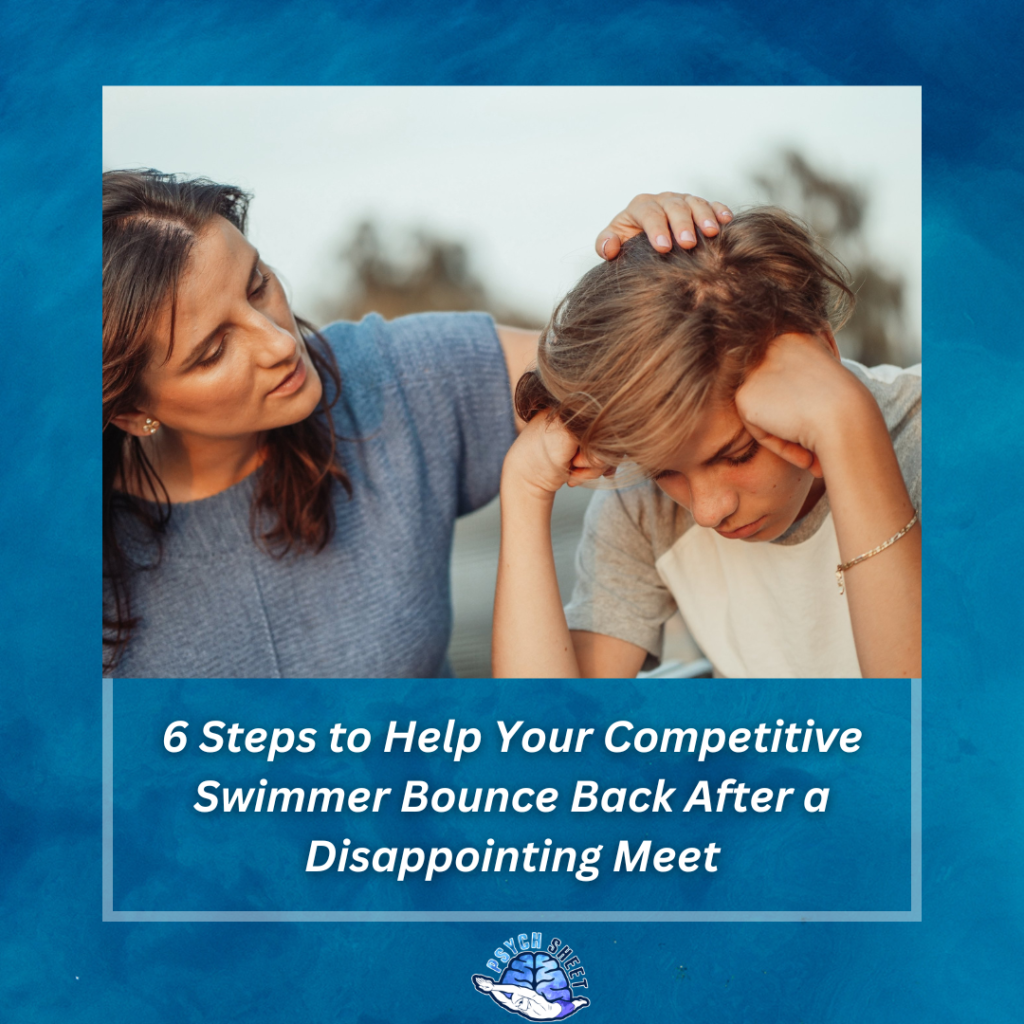6 Steps to Help Your Competitive Swimmer Bounce Back After a Disappointing Meet

Swimming can feel like a rollercoaster. One day, your child is smiling with a new personal best. The next, they may walk away from the pool feeling sad after a tough race. As a parent, it’s hard to see your young competitive swimmer feeling disappointed. But how you respond in these moments really matters. Your words and actions can help them feel supported and bounce back with more strength and confidence.
In this post, we’ll share simple ways to help your swimmer talk about their feelings, see setbacks as learning moments, and find the courage to keep going. You’ll learn how to turn hard times into chances for growth.
By the end, you’ll feel better prepared to guide your competitive swimmer through both the good days and the tough ones. Because with your support, they can learn to face challenges, stay strong, and keep loving the sport they’ve worked so hard for.
Step 1: Let Them Feel Disappointed
When your competitive swimmer feels sad after a race, your first thought might be to cheer them up quickly. But sometimes, the best thing you can do is just let them feel disappointed.
Disappointment is a normal part of any sport. It means they care and wanted to do well. Instead of rushing to fix their feelings, try saying something kind and simple like:
“I know you’re upset, and that’s okay. You tried your best, and it matters.”
“It’s hard when things don’t go as planned. I’m proud of you, and I’m here.”
By letting them feel their emotions, you show that it’s safe to be real. You’re not judging them or rushing them to feel happy again. You’re just being there. This gentle support helps your competitive swimmer learn how to deal with tough moments in a healthy way. It builds emotional strength and trust, both in themselves and in you.
Step 2: Shift the Focus to Effort
After your competitive swimmer has had time to feel their emotions, it’s time to gently guide them toward the positives. Help them see that their worth isn’t based on the scoreboard. It’s about the effort, the heart, and the hard work they put in every day.
Try saying:
Effort Matters Most: “You gave it your all in practice and at the meet. That effort means more than one race result. Every great competitive swimmer has tough days.”
Notice Progress: “Your dive looked so strong today. That’s a big improvement. Sometimes growth doesn’t show up in the final time right away.”
Learn from Setbacks: “This meet is part of the process. It shows us what to work on next so you can come back even better.”
These small shifts in how you talk about the meet can help your swimmer feel proud, even after a hard day. It teaches them to value growth over results, and that’s something they’ll carry with them both in and out of the pool.
Step 3: Help Them Name Their Feelings
Sometimes, a competitive swimmer feels upset but doesn’t know how to explain why. The emotions can feel big and confusing. As a parent, you can help by gently asking questions that let them talk it out.
Try simple, caring questions like:
- “What was the hardest part of today for you?”
- “Was there anything that made you feel proud during the meet?”
- “What’s something you’d like to work on next?”
These questions give your swimmer a chance to pause, think, and put their feelings into words. Once they can name what they’re feeling, like frustration, sadness, or even a bit of pride, it becomes easier for them to understand and manage those emotions.
Talking through the meet helps them feel more in control. It shifts the focus from feeling stuck to thinking about what’s next. This kind of reflection builds strength and resilience. By helping your competitive swimmer name their feelings, you’re giving them a valuable tool, not just for swimming, but for life.
Step 4: Be Their Biggest Cheerleader (Unconditionally)
Your love and support mean everything to your competitive swimmer. When they know you’re proud of them no matter what, it builds deep confidence that lasts.
Studies show that kids who feel their parents’ support, win or lose, are stronger, bounce back faster, and believe in themselves more.
Here’s how to show that kind of support:
Be Present: Whether you’re cheering at the meet or waiting at home with a smile, your presence matters more than words.
Love Without Conditions: Say things like, “I’m proud of you no matter what the clock says.” This reminds them their value isn’t about winning.
Celebrate the Effort: Point out their courage and hard work. Say, “I saw how hard you pushed yourself; that was amazing.”
These simple words go a long way. They help your competitive swimmer feel safe, supported, and seen for who they are, not just for what they achieve. This kind of love builds strength that goes beyond the pool. It teaches them: I am enough. Always.
Step 5: Set a Game Plan
After your competitive swimmer has had time to feel their emotions and reflect, it’s time to look ahead. Turning disappointment into a plan for growth helps them feel strong and in control again.
Here’s how to build that plan together:
Reflect as a Team: Sit down and ask gentle questions like, “What do you think went well today?” or “What’s one thing you want to improve?”
Set Small Goals: Help them pick one or two things they can work on like turns, starts, or staying calm under pressure. Say, “Let’s focus on turns this week and practice a few extras.”
Celebrate the Little Wins: When you see them trying or improving, cheer them on. Say, “I noticed your turn looked sharper today great job!”
These steps help your competitive swimmer feel proud and motivated. They see that even after a tough race, there’s always a way forward. With your support and a clear plan, they’ll grow stronger both in and out of the pool.
Step 6: Model Resilience
Your competitive swimmer learns a lot by watching you. How you deal with your own challenges can teach them how to face theirs.
If you stay calm, keep trying, and talk openly about your feelings, they’ll be more likely to do the same. Sharing your own stories helps them understand that setbacks are a normal part of life.
You might say something like:
“I remember when I didn’t get the job I really wanted. I felt really disappointed. But I took that time to learn new things, and it helped me grow. Later, I got an even better job.”
When your child sees you bounce back from tough moments, it shows them how to stay strong too.
Let them know that it’s okay to feel sad or frustrated, but what matters most is how we keep moving forward. By modeling resilience, you’re giving your competitive swimmer a powerful example to follow. You’re showing them that setbacks don’t stop us; they help us grow. That lesson will stick with them far beyond the pool.
Turning Setbacks into Comebacks
It’s hard to watch your child struggle with disappointment, but these moments are also opportunities for growth. By validating their feelings, reframing their perspective, and showing unconditional support, you can help them build resilience and confidence that will serve them in swimming and beyond.
Remember, every competitive swimmer, from beginners to Olympians, has tough meets. It’s how they respond to those moments that shapes their future. With your guidance, your competitive swimmer can turn setbacks into steppingstones and come back stronger than ever.
So, the next time your competitive swimmer walks away from the pool feeling down, take a deep breath, give them a big hug, and remind them that every race is part of their journey. You’re in this together, and their best is yet to come. Looking for additional tips and resources? Check out USA Swimming’s Parent Resources for expert advice on supporting your swimmer every step of the way.
If you’re looking for more ways to support your competitive swimmer, visit PsychSheet.com to schedule a discovery call. Let’s work together to help your child thrive both in and out of the pool!
